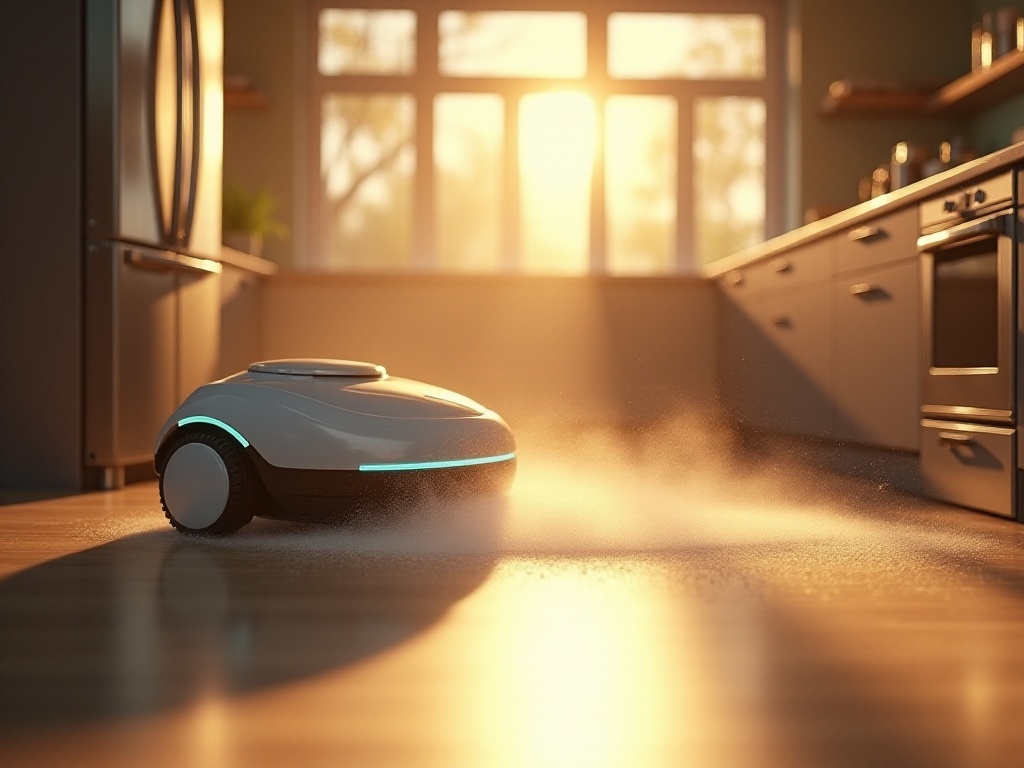
Preface
Home maintenance is a topic no one can avoid. As a recent graduate and young professional, I've been exploring how to keep my home in perfect order through my experiences of renting and buying properties over the past few years. Today, I'll share all the pitfalls I've encountered and the experience I've accumulated, from initial confusion to current competence.
I remember when I first moved into my new house, I couldn't even hammer a nail, and had to call property management or housekeeping for every issue. But as time went on, I gradually realized that many home maintenance tasks could be done by myself. Through continuous learning and practice, I've developed a set of simple and practical maintenance methods. Trust me, once you master these skills, you can easily become a home maintenance expert.
Safety First
When it comes to home maintenance, safety is always the top priority. I remember visiting a friend's house last month and checking for safety hazards while chatting. I discovered that his smoke detector hadn't had its batteries changed for almost two years, which worried me greatly. You know, these seemingly insignificant safety devices could be lifesavers in crucial moments.
Since then, I've designated the first day of each month as "Safety Check Day." On this day, I press the test buttons on both smoke and carbon monoxide detectors to ensure they're working properly. According to fire department data, regular checking and maintenance of smoke detectors can reduce fire-related casualties by over 50%. Think about it - this small habit could save your life in an emergency, talk about return on investment!
Regarding electrical safety, many young people, like I was initially, don't know that GFCI outlets need monthly testing. This issue is particularly important because statistics show that about 75% of household electrical accidents are related to faulty GFCI outlets. Testing is super simple: just press the test button and confirm it trips automatically. The whole process takes only 30 seconds but can make your home safer.
Besides these basic safety checks, I regularly inspect household wires. Pay special attention to frequently bent wires, like phone charging cables and laptop power cords, looking for damage. If you find damaged wire insulation, replace it immediately - never take chances.
I'd also like to share a commonly overlooked safety hazard: power strip usage. Many people like to stack power strips, which is extremely dangerous. According to electrical department recommendations, a socket should not simultaneously connect devices exceeding 80% of its rated power. For example, if your home socket's rated current is 16A, the total current of all connected devices should not exceed 13A.
In my home, I specifically purchased several power strips with overload protection. Though more expensive, they provide peace of mind. I've also labeled each power strip, noting which devices are connected, so I can clearly know the load situation of each socket.
Door lock safety checks are also important. Every month, I check if door locks are loose and if hinges need oiling. If you find the lock sticking or keys not moving smoothly, you can lubricate it slightly with graphite powder. This small tip can extend the lock's lifespan by several years.
Speaking of safety, I must especially remind everyone about gas safety. Although many young people use induction cookers now, I still recommend getting a gas leak detector. This device isn't expensive but can truly save lives. My gas detector once helped me discover a small gas leak, allowing timely problem detection and resolution, avoiding potential dangers.
Window safety checks shouldn't be ignored either. Especially for those living in high-rise buildings, regularly check window seals and tracks. I check window operation smoothness and seal condition monthly. If problems are found, it's best to have professional repairs immediately - don't wait until a typhoon comes to discover your windows won't close properly.
Finally, I want to discuss emergency lighting. I've placed emergency flashlights in several key locations around my home, like bedside tables and entrance cabinets. I check the batteries every three months to ensure they're ready during power outages. Though simple, this preparation proved very helpful during a sudden power outage last year.

Air Conditioning Maintenance
Air conditioning systems are absolutely one of the home appliances we young people can't live without, but they're also one of the most easily neglected maintenance objects. Honestly, I didn't know air conditioners needed so much maintenance until I received a shocking electricity bill last summer, which made me start seriously studying air conditioner maintenance.
Did you know that a dust-filled air conditioner filter can increase power consumption by 30%? This data frightened me. Since then, I've developed the habit of cleaning the air conditioner filter monthly. The effect is particularly noticeable - not only did the electricity bill decrease, but indoor air quality also improved significantly. Now I no longer have those unexplained sneezing episodes.
Cleaning the air conditioner filter is actually very simple. First, remove the filter (usually behind the front panel), vacuum off surface dust, then gently wash with warm water and neutral detergent. Remember to let the filter dry completely before reinstalling, otherwise bacteria might grow.
According to Department of Energy data, regular cleaning of air conditioning systems can save 10-15% in electricity usage. This data is no joke. I suggest you check your air conditioner filter now - if it's covered in dust, that's a signal it needs cleaning.
Besides basic filter cleaning, other parts of the air conditioner also need regular maintenance. For example, every spring before starting to use the air conditioner, I check the outdoor unit. I look for leaves or debris blocking the heat sink, and gently clean external dust with a soft brush. This not only improves cooling efficiency but also extends the air conditioner's lifespan.
Air conditioning usage tips are also important. For instance, on particularly hot days, don't set it to the lowest temperature right away. This not only wastes electricity but can also cause physical discomfort. My suggestion is to run dehumidification mode for 10 minutes first, then adjust to a suitable temperature (generally 26-28 degrees). This is both comfortable and energy-efficient.
Here's another tip I recently learned: when using the air conditioner, you can turn on the swing function. This not only makes room temperature more uniform but also avoids cold air constantly blowing in one direction. However, note that when sleeping, it's better to turn off the swing function to avoid catching a cold.
Oh, air conditioner remotes also need some attention. I've found many people experience sudden remote malfunctions, mostly caused by poor battery contact. My suggestion is to regularly clean the metal contact points with an eraser, which can avoid many troubles.
While using air conditioning, also pay attention to indoor ventilation. My habit is to open windows for 15 minutes each morning and evening, which maintains fresh indoor air without wasting too much energy. During rainy seasons, you can also use a dehumidifier, making the indoor environment more comfortable.

Waterproofing Key Points
Waterproofing issues are absolutely one of the most headache-inducing home maintenance items. Last year, water seeped through my bathroom tile grout, costing several thousand in repairs. This lesson made me deeply realize how important prevention is in home maintenance.
After that experience, I developed a prevention plan: check bathroom and kitchen waterproof sealant quarterly, paying special attention to cracking, yellowing, or mold. Address any problems immediately. Applying waterproof sealant isn't difficult; the key is choosing the right material. I recommend choosing neutral silicone with anti-mold properties - though more expensive, it's much more durable.
Data shows that 90% of household water leakage problems stem from inadequate daily maintenance. So now I pay special attention to signs of water seepage at pipe joints and faucet bases. One trick is to stick tissue paper on suspicious areas - if it becomes wet after a while, there's a seepage problem.
Floor drain maintenance is also important. I pour a kettle of hot water down the drain weekly to flush away oil and debris. If the drain flows slowly, washing with a mixture of cleaning powder and hot water works well.
Waterproofing also requires attention around windows. During heavy rain, I pay special attention to water seepage around window edges. If problems are found, they can be treated with waterproof sealant. However, note that the surface must be cleaned thoroughly before treatment, otherwise the sealant may easily peel off.
Speaking of waterproofing, I must especially remind everyone about the balcony drainage system. Many leakage problems actually start from the balcony. I now check the balcony drain and drainage pipes monthly to ensure they're not blocked by leaves or garbage.
For kitchen waterproofing, I have a unique trick. I apply a layer of transparent waterproof coating in areas around the sink that frequently contact water. This way, even if water splashes on the counter, you don't need to worry about it seeping into cracks and causing mold.
The washing machine location also needs special attention to waterproofing. I placed a waterproof tray under the washing machine, so even if the drainage pipe has problems, it won't cause floor seepage. I also regularly check the washing machine's inlet and outlet pipes, replacing them immediately if signs of aging are found.
Bathroom waterproofing is most crucial. Besides regular waterproofing measures, I pay special attention to shower door seals. This small component is often overlooked, but its role is very important. If you find the seal hardening or falling off, replace it promptly to prevent seepage.
Finally, let's talk about balcony planting waterproofing issues. Many young people like to grow flowers on their balconies, but note that flower pots must have trays to catch water. Also control water amount when watering to avoid pooling. I suggest choosing drought-resistant plants, which can both beautify the environment and not put too much pressure on waterproofing.

Daily Cleaning
Regarding daily cleaning, bathroom mold is the most troublesome issue. According to surveys, 42% of households struggle with bathroom mold. I was also troubled by this problem for a long time until I mastered some practical cleaning techniques.
First, good habits are particularly important. Always run the exhaust fan for at least 15 minutes after showering - I've maintained this habit for over two years. Plus, I wipe tile grout with white vinegar weekly. Though simple, this method is really effective. Vinegar not only kills bacteria but also prevents mold, and it's cheap and environmentally friendly.
I also discovered a particularly useful cleaning tip: spray a layer of anti-mold spray on bathroom walls and ceiling - the effect lasts several months. Though these sprays are expensive, the saved cleaning time and effort are definitely worth it.
Regarding kitchen cleaning, range hood cleaning is a big issue. My current method is: hot water and degreaser mixture spray-washing the filter weekly, with thorough dismantling and cleaning every three months. This not only keeps the kitchen clean but also extends the range hood's lifespan.
Daily floor maintenance is also important. I use hardwood floors, sweeping daily with a dry mop and wiping weekly with a slightly damp mop. Remember never to use a too-wet mop as it will damage the floor. If you find scratches, gently rubbing with walnut kernels works surprisingly well.
Furniture maintenance also requires technique. Leather sofas need regular wiping with professional care products, fabric sofas need frequent vacuum cleaning, and professional deep cleaning every six months is best. My fabric sofa still looks new after three years due to regular maintenance.
Window cleaning is another focus. My experience is to clean windows on cloudy days because direct sunlight makes cleaners dry too quickly, making cleaning harder. When cleaning windows, first wipe with newspaper, then use disposable cloths with glass cleaner for extra brightness.
Appliance cleaning can't be neglected. For frequently used small appliances like electric kettles, I descale with food vinegar monthly. If rice cooker inner pots show black marks, soaking in baking soda and hot water then gently wiping can remove them.
Wardrobe organization is a pain point for many young people. I suggest doing a major cleanup each season change, storing rarely worn clothes. Place some desiccant packets and mothballs in the wardrobe to prevent moisture and insects while keeping clothes fresh.
Shoe cabinet deodorizing is also technical. I place several activated charcoal packets in the shoe cabinet and regularly air out shoes, preventing unpleasant odors. If shoes smell, placing tea bags in them overnight helps significantly.
Finally, let's discuss bathroom deodorizing. Besides regular air fresheners, I also place a deodorizing block in the toilet tank, maintaining freshness with each flush. I often wipe around the toilet with vinegar water, which both disinfects and deodorizes.
Seasonal Preparation
As seasons change, home maintenance focus must adjust accordingly. I deeply understand this because I previously encountered many problems during season changes due to not doing timely seasonal maintenance.
Spring is the best time for deep cleaning. This season focuses on cleaning roof drainage gutters, checking for leaf blockages. Environmental Protection Bureau data shows regular gutter cleaning can reduce roof leakage risk by 80%. I usually clean gutters once each in spring and fall, ensuring no blockages when rainy season comes.
Spring also requires checking exterior walls for cracks. After winter, walls may develop small cracks due to temperature changes. Problems should be repaired promptly to prevent seepage during rainy season. I use elastic putty that can flex with slight wall deformation without cracking.
Summer focuses on ventilation and cooling. Besides regular air conditioner filter cleaning, I also check window screens for damage. Good screens let you enjoy natural breeze without air conditioning while preventing insects. If screens have holes, they can be fixed with special screen repair patches.
Another summer focus is sun protection. I check curtains' light-blocking effectiveness, replacing blackout fabric when necessary. I also install shade nets on the balcony, both blocking sun and allowing some light through.
Fall requires winter preparation. This season focuses on checking door and window seals. I test with paper - if it can be pulled through door or window gaps, sealing is poor and weatherstripping needs replacement. Good sealing saves significant heating costs in winter.
Fall also requires checking heating systems. If using floor heating, test run early to check for leaks or cold spots. For radiators, check valve flexibility and consider professional pressure testing if needed.
Winter focuses on warmth and fire prevention. This season uses more heating equipment, requiring special attention to electrical safety. I regularly check heater power cords for damage and keep them away from flammable items. Also prepare anti-slip mats to prevent slipping on icy surfaces.
I change bedding materials each season. Cotton for spring and fall, cool bamboo fiber for summer, and warm flannel for winter. This is not only comfortable but reduces air conditioner usage.
During season changes, I also maintain furniture. For example, oiling wooden furniture in spring and fall, moisturizing leather sofas in winter. These details greatly extend furniture lifespan.
Storage methods also vary by season. During season changes, I compress rarely used clothes in vacuum bags, saving space while preventing moisture and insects. I also adjust storage cabinet layout by season, placing frequently used seasonal items in easily accessible locations.

Money-Saving Tips
Regarding maintenance costs, as a young person working for just a few years, I also rack my brains thinking of ways to save money. Recently I discovered a particularly money-saving method: using a mixture of baking soda and white vinegar to unclog drains, surprisingly as effective as professional drain cleaners, plus more environmentally friendly and cheaper.
The specific method is: first pour half a cup of baking soda down the drain, then pour in half a cup of vinegar, cover the drain and wait 5 minutes, finally flush with hot water. I've used this method several times, always effectively. The key is these two items together cost just a few dollars, much cheaper than professional drain cleaners that easily cost dozens.
Cleaners are another area for saving money. I now make many cleaners myself, like glass cleaner using a mixture of white vinegar, water, and a little dish soap. Not only cheap, but also without harsh chemical smells.
Furniture maintenance also has money-saving tricks. Rather than buying expensive furniture care products, use olive oil to maintain wooden furniture. The effect is similar but much cheaper. Same for leather care - gentle wiping with olive oil not only nourishes leather but saves lots on maintenance costs.
For lighting, I switched everything to LED bulbs. Though initial investment is higher, power consumption is only 1/10 of regular bulbs, plus much longer lifespan. By my calculations, costs are recovered in less than a year.
Floor scratch repair doesn't need to cost much either. I use walnut kernels for light scratches, with surprisingly good results. Deep scratches can be gently colored with matching markers, barely noticeable from a distance. Much cheaper than paying hundreds for professional repairs.
Mold and moisture prevention doesn't necessarily require a dehumidifier. Placing some activated charcoal boxes in damp-prone areas works quite well. The charcoal can be sun-dried and reused, particularly economical.
Appliance maintenance also has money-saving methods. Like air conditioner cleaning, you don't always need professionals - cleaning the outdoor unit yourself with a high-pressure water gun works well too. Of course, this must be done safely.
Same for range hood cleaning - you don't need professional cleaning every time. Regular wiping with hot water and degreaser reduces need for professional cleaning. This saves quite a bit in cleaning fees over a year.
Furniture renovation doesn't always require buying new pieces. I previously had a sagging sofa cushion, bought some foam and fabric to refill it myself, spent less than 100 dollars to
Next
Comprehensive Home Maintenance Guide 2025: Refresh Your Home and Say Goodbye to Repair Troubles
A systematic guide to home maintenance covering safety system inspections, major household equipment care, daily cleaning routines, seasonal maintenance tasks, and practical repair techniques for establishing a comprehensive home care system
A Daily Glass of Lemon Water Will Quietly Transform Your Body
A comprehensive guide on establishing a healthy lifestyle through weight management, balanced nutrition, exercise planning, and essential home maintenance including daily cleaning and professional care tips
Life Hacks: Making Your Home Smarter and More Convenient
Discover practical life hacks and home maintenance techniques, from preventing doors from locking with rubber bands, cleaning microwaves with lemon, seasonal gutter cleaning, to sealing windows and doors for improved energy efficiency and comfort.
Next

Comprehensive Home Maintenance Guide 2025: Refresh Your Home and Say Goodbye to Repair Troubles
A systematic guide to home maintenance covering safety system inspections, major household equipment care, daily cleaning routines, seasonal maintenance tasks, and practical repair techniques for establishing a comprehensive home care system

A Daily Glass of Lemon Water Will Quietly Transform Your Body
A comprehensive guide on establishing a healthy lifestyle through weight management, balanced nutrition, exercise planning, and essential home maintenance including daily cleaning and professional care tips

Life Hacks: Making Your Home Smarter and More Convenient
Discover practical life hacks and home maintenance techniques, from preventing doors from locking with rubber bands, cleaning microwaves with lemon, seasonal gutter cleaning, to sealing windows and doors for improved energy efficiency and comfort.


